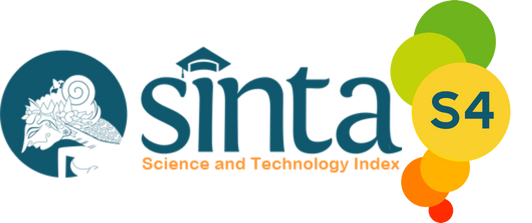Main Menu |
Editorial Team |
Submissions |
Focus and Scope |
Publication Ethics |
Peer Review Process |
Author Guidelines |
Author Fees |
About the Journal
Focus and Scope
Jurnal Kajian Pendidikan IPA (JKPI) is a journal managed by the Science Education Program, FPIK, Universitas Garut. The journal is dedicated to the dissemination of research findings and conceptual analyses in the domains of Science Education, Chemistry Education, Physics Education, and Biology Education. It provides a platform for scholarly discourse on contemporary issues, including pedagogical strategies, instructional media, curriculum development, and assessment methodologies within the scope of science education.
Peer Review Process
The submitted manuscript is the original work of the author, has not been previously published in any other journal, and is not currently under consideration or evaluation by any other journal. All submitted manuscripts in JKPI are evaluated by the editorial staff.
Manuscripts that do not align with the journal's scope or fail to meet its quality standards are promptly rejected without undergoing external review. Submissions deemed potentially valuable to the journal’s audience are forwarded for double-blind peer review, involving at least two independent reviewers.
Following the peer review process, the editorial team makes a decision based on the reviewers’ recommendations, which may include rejection, a request for revisions, or acceptance. Authors are informed of the editorial decision and provided with reviewer feedback as promptly as possible.
Research Articles and Review Articles published in the journal undergo rigorous peer review, which includes an initial screening by the Editor and anonymized evaluation by at least two independent reviewers. The journal maintains the right to decline manuscripts at the editorial screening stage if they do not meet the minimum requirements for consideration in the external review process.
Publication Frequency
Open Access Policy
This journal provides open access, which in principle ensures that research is freely available to the public and supports the largest possible global exchange of knowledge.

Publication Ethics
This statement outlines the ethical behavior expected from all parties involved in the publication of articles in the journal, including authors, the editor-in-chief, editors, peer reviewers, and the publisher (Science Education Program, FPIK, Universitas Garut). This statement is based on the COPE's Best Practice Guidelines for Journal Editors.
Journal Publication Ethic Guidelines
The publication of articles in JKPI, through a peer-review process, serves as a crucial building block in the development of a coherent and respected knowledge network. It directly reflects the quality of the authors' work and the institutions that support them. The peer-review process upholds and embodies the principles of the scientific method. Therefore, it is essential to establish an agreement on the ethical conduct expected from all parties involved in the publication process: authors, journal editors, peer reviewers, publishers, and the broader community.
The Science Education Program, FPIK, Universitas Garut, as the publisher of JKPI, takes its responsibility for all stages of publication seriously and recognizes its ethical obligations. We ensure that advertisements, reprints, or any other commercial revenues will not influence or affect editorial decisions.
Duties of Editors
Publication Decisions
The editors of JKPI are responsible for deciding whether a submitted article should be published. It is essential for researchers and readers to support these decisions as part of the validation process. Editors are guided by the journal's editorial policies and are constrained by applicable legal requirements regarding defamation, copyright infringement, and plagiarism. In making decisions, editors may consult with other editors or reviewers.
Fair Play
Editors must evaluate manuscripts based on intellectual content, without regard to the author's race, gender, sexual orientation, religion, ethnicity, nationality, or political philosophy.
Confidentiality
Editors and editorial staff must not disclose any information regarding submitted manuscripts to anyone other than the authors, reviewers, potential reviewers, other editorial advisors, or the relevant publisher.
Conflicts of Interest
Materials that have not been published in the submitted manuscript must not be used for the editor's own research without the written consent of the author. Confidential information or ideas obtained through the review process must be kept private and should not be used for personal gain.
Editors must recuse themselves (by requesting that a co-editor, associate editor, or other member of the editorial board review and consider the manuscript) from reviewing manuscripts where there is a conflict of interest due to competitive, collaborative, or other relationships or affiliations with any of the authors, organizations, or institutions associated with the manuscript.
Editors are required to ensure that all contributors disclose any relevant competing interests and publish corrections if competing interests are revealed post-publication. If necessary, appropriate actions should be taken, such as retraction of the publication or issuing an apology.
Involvement and Cooperation in Investigations
Editors must take prompt and appropriate actions when ethical concerns are raised regarding a submitted manuscript in relation to the publisher (or the broader academic community).
These actions generally include contacting the author(s) of the manuscript to address the specific complaints or claims made, further communication with relevant institutions and research bodies, and, if the complaint is substantiated, publication corrections, retraction, an apology, or other relevant notes.
Any reported instances of unethical behavior in publication must be monitored, even if such issues are discovered several years after publication.
Duties of Reviewers
Contribution to Editorial Decisions
The review process assists editors in making editorial decisions and, through communication between editors and authors, helps authors improve their manuscripts. Peer review is a crucial component of formal scholarly communication and is at the core of the scientific method.
Promptness
Any reviewer who feels unqualified to review the research presented in a manuscript or knows that they are unable to complete the review in a timely manner must notify the editor and withdraw from the review process.
Confidentiality
Manuscripts accepted for review must be treated as confidential documents. These manuscripts must not be shared or discussed with others unless authorized by the editor.
Standard of Objetivity
Reviews must be conducted objectively. Personal criticism of the author is not permissible. Reviewers must clearly present their evaluation and provide supporting arguments for their assessment.
Acknowledgement of Sources
Reviewers must identify any relevant manuscripts that have been published but not cited by the author. Any statement that includes observations, derivations, or arguments previously written should be accompanied by appropriate citations. Reviewers should also communicate with the editor if they identify any substantive similarities or overlap between the manuscript under consideration and other previously published works.
Conflicts of Interest
Unpublished materials in the manuscript must not be used for the reviewer’s own research without the written consent of the author. Any privileged information or ideas obtained through the review process must be kept confidential and should not be used for personal gain.
Reviewers should not consider manuscripts in which they have a conflict of interest due to competitive, collaborative, or other relationships with any of the authors or organizations associated with the manuscript.
Author Fees
This journal charges the following author fees.
Article Submission: 0.00 (IDR)
Authors are required to pay an article submission fee as part of the submission process to contribute to the costs of the review process.
Article Publication: 500.000 (IDR)
If this paper is accepted for publication, you will be asked to pay an Article Publication Fee to cover publications costs. This publishing fee will not influence editorial decision making.
Indexing
Manuscripts that are accepted and published will be freely accessible on this website and in the following indexing and abstracting databases:













